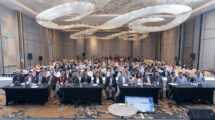Interview by: Rosanna Norman, GÉANT
Safe and secure programming on the edge
Mira, thank you for kicking off TNC23 with your keynote. What is the project you presented in your keynote in a nutshell? What are the benefits of software decentralisation?
Today’s computing infrastructure is globally distributed. The back-end of our computing infrastructure consists of geo-replicated cloud facilities; these have extensive computational power and storage, are connected with each other via mostly stable connections, and are managed by engineers of tech companies; computations are distributed and replicated across machines for scalability and availability. The back-end is the traditionally distributed computing. On the edge of the internet, there are millions of increasingly powerful devices – mobile phones, autonomous vehicles, drones, sensor networks, satellites, etc. The edge is woven with the physical and social worlds, it is out of control of skilled engineering teams; distribution is here inherent (people, devices, data sources are inherently distributed); likewise, concurrency is inherent due to people and devices acting autonomously in time and space. Not only end-to-end connections, but also local connections are often disrupted; partitions are the norm, connectivity the exception.
Instead of featuring batch processing on top of (geo-replicated data stores, today’s applications – social apps, collaborative workflows, real-time businesses, software for autonomous vehicles, environmental monitoring, production 4.0 and more – are interactive and learning-based. They interact with the outside world – the order of their computations is not determined by their code but driven by the flow of events/data; their behaviour is (partly) learned from data via learning algorithms. Learning is becoming interactive too, moving away from static learning from stationary datasets towards active, continuous learning in interaction with the outside world.
Currently, computing is mostly centralised (data is collected, managed, processed in the cloud and edge devices serve basically as interfaces to the outside world). The centralisation has a lot of advantages as it enables the described complexity to be handled by highly skilled engineering teams at big tech companies. But there are issues with it: lost control over ownership and privacy of data, lack of offline availability, poor latency, inefficient use of communication infrastructure, waste of computing resources on the edge. Crucially, centralisation is not viable for computing infrastructures where being off-line or having limited bandwidth is a widespread phenomenon (e.g., autonomous vehicles operating in rural areas); at the same time decentralisation is becoming viable due to increased resources of edge devices – the “data centres” of the 21st century.
Existing programming methods are not up to the challenges resulting from the above shifts – hence, as of today, decentralisation is not really viable. My research aims to fill the gap by establishing foundations and developing corresponding tools for programming safe and secure interactive and learning applications running on globally distributed computing infrastructures with decentralised control.
Could you highlight your experience as a successful Albanian scientist and the impact of your research and role as an ambassador for Albanian research excellence in Europe and the rest of the world?
This is a difficult question, in the sense that I can’t really highlight my experience as an Albanian scientist, as I am actually a German scientist – my whole scientific career, after completing my studies in Albania, developed in Germany (and partly the US). Needless to say, I am happy to be seen as an ambassador for my home country, as I hope it demonstrates that Albanians are capable of becoming world leaders in their areas of expertise.
As a successful female academician in STEM which challenges did you encounter over the course of your career?
Personally, I can’t say that I encountered specific challenges as a female academician in STEM, beyond the recurring experience of often being the only female in the room. I believe that being in the minority gender in any field, makes it more difficult to achieve one’s goals and convey one’s views. This is why we need to urgently change the picture and try to get more female students interested in studyingSTEM subjects. Unfortunately, this is a complex problem as it requires deep societal changes.
Were you familiar with TNC? When did you first hear about our annual conference?
I was not familiar with TNC before being invited to give the keynote, but after reading about the conference and its impressive history, I am really delighted to meet and present to the international research and education community.
What’s around the corner for Mira Mezini?
Together with few members of my team, I recently founded a startup company in the area of software security and I am in the first stages of the preparation to the next transition of our research results and we are ready to present them to the real world – the topic of my TNC23 keynote focusses in fact on such results. So, I am really looking forward to some very exciting times ahead, and I am ready to face the challenges that my profession and my research will present along the way.







